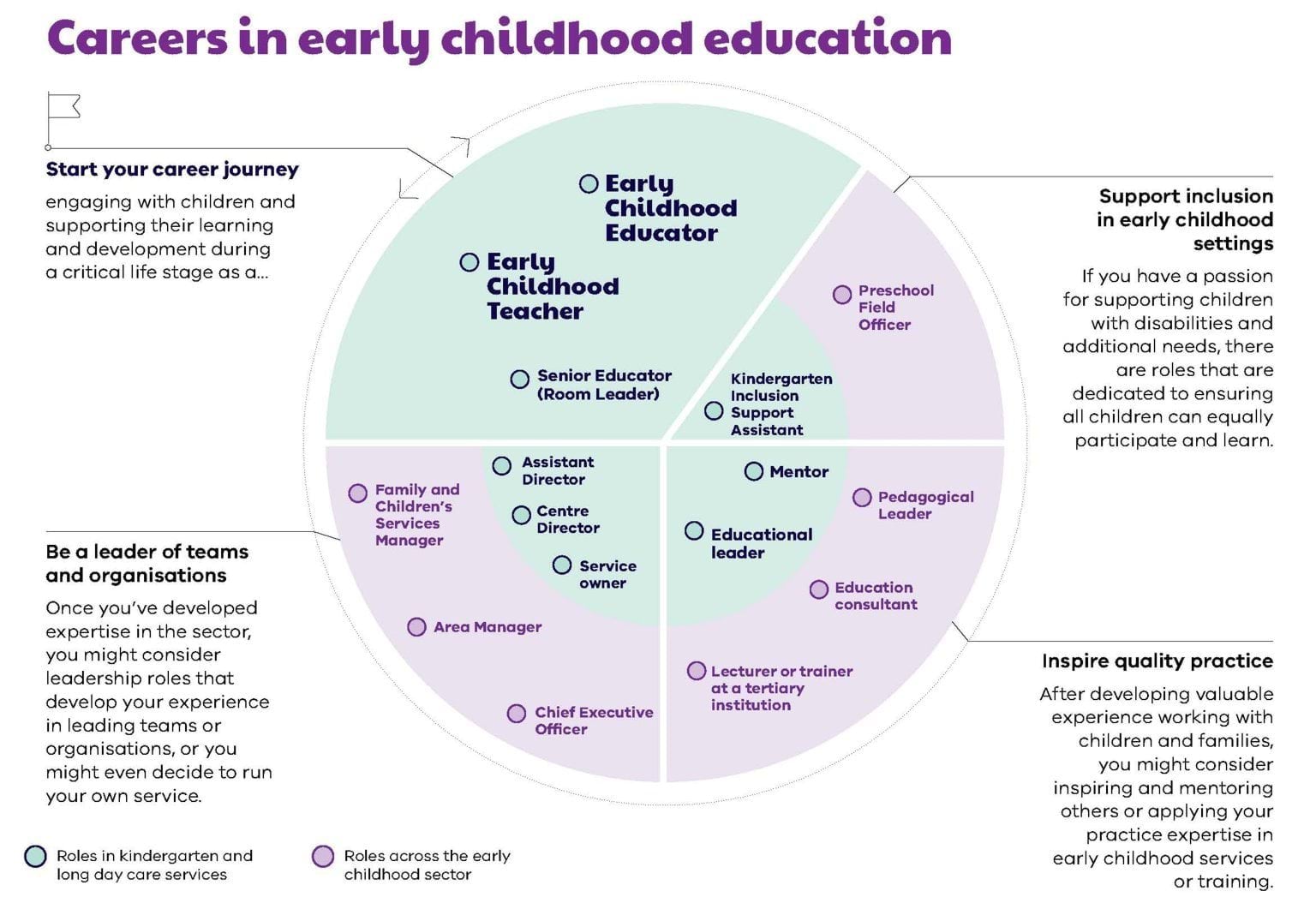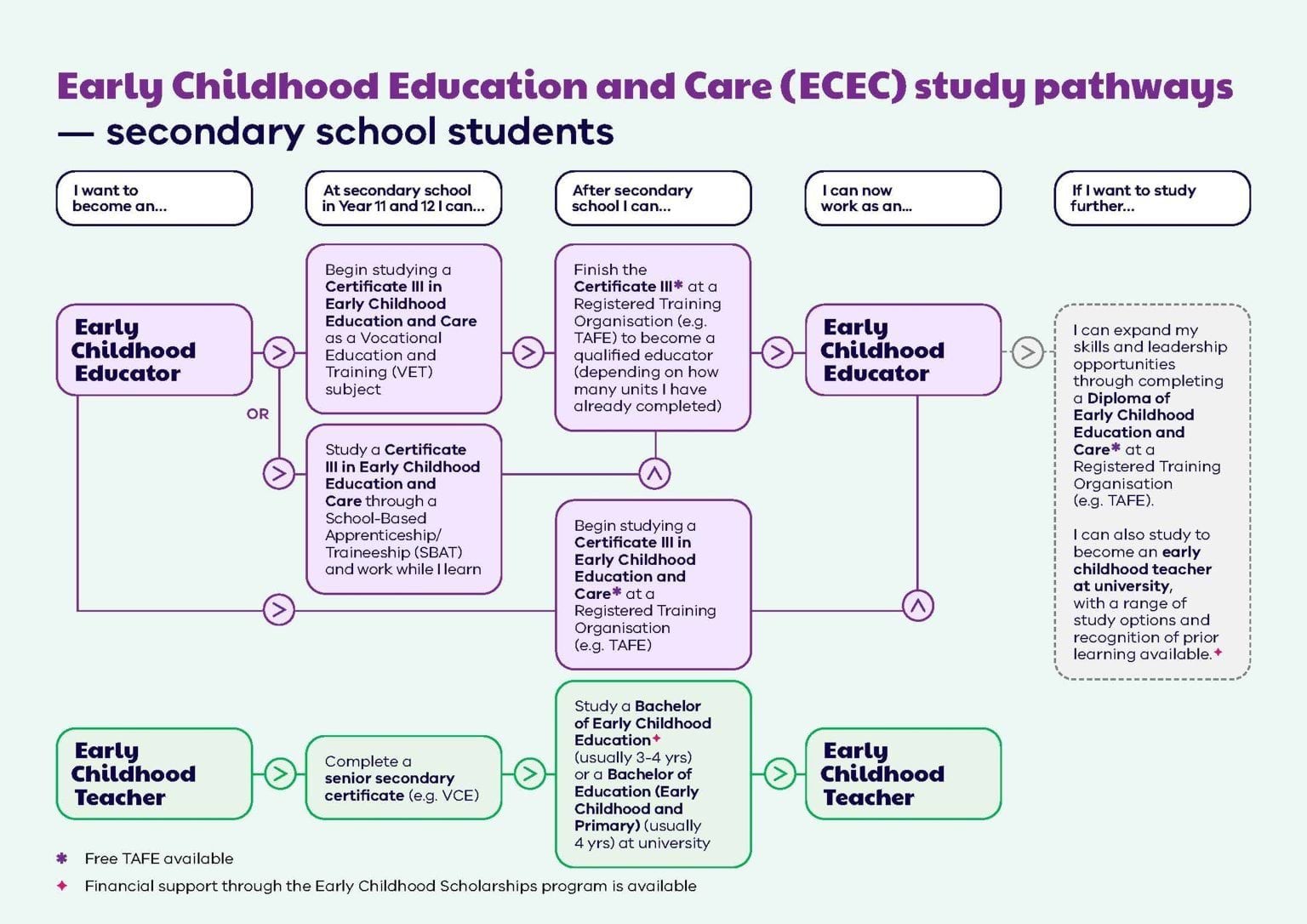- Published by:
- Department of Education
- Date:
- 16 June 2025
This guide for Victorian career practitioners is designed to support conversations with secondary school students who are exploring study and career options. It provides up-to-date information about the pathways into early childhood education — a growing sector with strong demand and a range of rewarding careers across Victoria.
What does this information guide cover?
- Reasons why early childhood education is a meaningful and in-demand career
- Study pathways that are available during school and afterwards
- Roles and career progression opportunities across the early childhood sector
- Financial supports like Free TAFE and scholarships to help with study
Why choose a career in early childhood education?
Make an impact and give children the best start in life
Early childhood education is a values-driven career path that’s suited to students who are passionate about making a difference in their community. They will get to be creative while supporting children’s learning and growth through play.
Did you know?
Around 90% of a child’s brain develops before the age of five, making early childhood education a critical foundation for life.
Join an in-demand and growing sector with job security and opportunities for career progression
The Victorian Government’s investment in the Best Start, Best Life reforms means the early childhood education sector is growing. Thousands of jobs are being created across the state. The reforms include:
- expanding Three-and Four-Year-Old Kindergarten, which will significantly increase the hours of play-based learning in the years before school
- establishing 50 government owned and operated early learning and childcare centres in areas of high demand.
Roles and career progression in early childhood education
Explore the range of diverse roles and opportunities available as part of an early childhood career.
What roles are available in early childhood?
The early childhood workforce has a strong culture of professional development, and there are opportunities to upskill, specialise, or step into leadership roles over time.
There are 2 main roles students can start their career in. They can start as an:
Early childhood teacher
Early childhood teachers have expertise in children’s learning and development, and use this knowledge to design and lead engaging play-based kindergarten programs for children aged 3 to 5.
Teachers shape programs that encourage learning and growth, observe and document children’s progress, support and mentor other staff, and build relationships with families and other professionals to support children.
Students can start their career as an early childhood teacher by completing a bachelor degree at university.
Early childhood educator
Early childhood educators prepare and deliver play-based learning activities for children from birth to 5.
Educators work with early childhood teachers to deliver kindergarten programs, observe and record children’s learning and development, and support relationship building with families.
Students can start their career as an educator by completing a vocational qualification at a Registered Training Organisation (e.g. TAFE). There are options to start work while they complete their training.
Both early childhood teachers and educators play a critical role in supporting the social, emotional, physical and cognitive development and wellbeing of young children.
Virtual job experience
Encourage students to complete a virtual work experience module to learn more about working as an early childhood teacher or educator.
Where do early childhood teachers and educators work?
Early childhood teachers and educators work in a variety of settings from small sessional kindergartens in a local community, to large organisations operating over 100 services nation-wide. The 2 main settings teachers and educators work in are:
Sessional kindergartens: A service that operates a kindergarten program for 3 to 5-year-olds on specific days and times.
Long day care centres: A service that offers full days of education and care for children from birth to 5, with an integrated teacher-led kindergarten program for 3 to 5-year-olds.
As professionals develop their knowledge, skills and experience, they may decide to upskill from a role as an educator to a teacher by undertaking further study.
They might also look for opportunities across the early childhood sector, for instance, in broader support or leadership roles, in larger organisations or local government, or at tertiary institutions training the future workforce.
Undertaking work experience in Years 9 or 10 at either of these settings is a great way for students to learn more about early childhood education careers.
Consider reaching out to local early childhood services or training providers to organise opportunities for students to hear directly from early childhood professionals, current students or alumni.
What does career progression look like?
The diversity of roles in the sector allows people to continue learning and developing skills in areas that interest them most. Early childhood teachers and educators can also move into a range of leadership roles in small or large organisations, local government or tertiary institutions.
This diagram provides a snapshot of the range of roles available in a career in early childhood education.
Early childhood education is more than a job, it’s a career. Early childhood careers have great diversity of experiences and endpoints - including pedagogical, research, and organisational leadership - and fantastic flexibility.
Study pathways available for students
Learn more about the range of study options to suit student needs and interests, including vocational and tertiary pathways.
There are a range of study pathways available to students
There are many entry points to studying early childhood education including as part of students' secondary school studies. This diagram provides an overview of these pathways. You can find more information in the sections that follow.
Students can start studying to become an early childhood educator while at school
As part of VET Delivered to School Students, students can start a Certificate III in Early Childhood Education and Care and complete it after school at a Registered Training Organisation. They may choose to do this through a school-based traineeship to gain practical, hands-on experience by combining study with paid, part-time employment at an early childhood service.
Students aren’t locked into one career path. After completing a Certificate III, they can later upskill to a diploma (this usually takes one year) to deepen skills and knowledge and increase leadership opportunities. Students can then pursue further study to become a degree-qualified early childhood teacher by studying a bachelor's degree (approximately 2 years with recognition of prior learning).
Listen to Tiana’s experience undertaking a school-based traineeship.
Students can study to become an early childhood teacher after finishing school
Students who complete VCE (or equivalent) can apply to study a Bachelor of Early Childhood Education at university, which typically takes 3 to 4 years.
- The minimum ATAR generally ranges from 50-70, depending on the university.
- Most courses do not have prerequisite subjects though many subjects are useful in preparing students, including English, Mathematics, Art, Health, and Psychology.
Financial and study supports
Find out about the range of financial and study supports to help students succeed.
There are financial and study supports available to help get started
There has never been a better time to study early childhood education, with a range of financial supports and flexible study pathways available. Depending on their chosen career path, students can access:
Free TAFE
This covers tuition for eligible students undertaking a Certificate III in Early Childhood Education and Care. This includes students who have started their training through school and want to continue studying afterwards.
Early Childhood Scholarships Program
Up to $25,000 in financial support to study a Bachelor of Early Childhood Education. All students can apply once they have proof of enrolment, and this financial support can be used for course fees, living costs, or other education expenses such as a laptop.
Listen to scholarship recipient Molly’s journey from school to early childhood teaching.
Early Childhood Tertiary Partnerships Program
A range of different courses are available through the Early Childhood Tertiary Partnerships (ECTP) program including school based apprenticeships and traineeships, and university degrees. Each course has been designed to provide benefits and supports (e.g. mentoring) that students might need while they study.
Other supports
There are also supports while studying, including a new Australian Government subsidy to help eligible students manage costs during early childhood teaching placements. Support continues in the workforce with mentoring, networks, professional development, financial incentives, and relocation assistance to take up roles at priority services.
Find out more Financial support to study and work in early childhood
Overview of resources and supports
Bring this career information to life with case studies to share with your students.
Case studies
Learn more about a career in early childhood education
Become an early childhood teacher or educator
Find an early childhood course
Career opportunities and support in the early childhood education sector
About the Best Start, Best Life reforms
Virtual early childhood education work experience module
Find out more about the financial and study supports available
Financial support to study and work in early childhood
Australian Government support for teaching placements
If you have any questions, email the department at early.childhood.jobs@education.vic.gov.au


